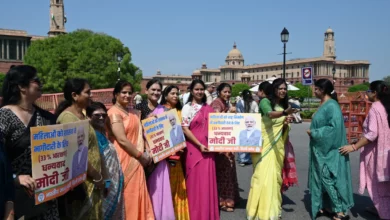
It was an image that shocked Egypt and within hours went viral: the woman in the exposed blue bra being beaten and kicked by a gang of soldiers during an attack on Tahrir Square protesters.
In a press conference on Sunday, General Adel Emara, a member of the ruling Supreme Council of the Armed Forces (SCAF), downplayed the incident, telling reporters that “they should consider all the circumstances” before judging.
On Tuesday, women responded. Some 4000 took to the streets in a march organized by the Mohamed ElBaradei Campaign and the April 6 Youth Movement.
Later on Tuesday evening, the SCAF issued an apology to the “women of Egypt,” in its statement Number 91.
“The SCAF reaffirms its upmost respect and admiration for the women of Egypt and their right to protest and of positive participation in political life on the path of democratic change Egypt is currently witnessing,” the statement reads. “All legal measures have been taken to hold officials accountable for transgressions,” it continues.
In Tahrir Square, women gathered, surrounded by men whose linked hands formed a cordon to protect them. One of the men, Mohamed Fathy, said he supported the idea of a women-only march because "they are here defending their rights and have to have their say."
After circling the square once the march proceeded through downtown Cairo — the scene in 2007 of horrific mass assaults during the Eid vacation when packs of youths sexually assaulted women.
Their chants, “Girls of Egypt are a red line” — a variation on the now-abandoned “The Egyptian army is a red line” — echoed around the street. From balconies, office workers clapped and cheered. The women chanted for them to join them saying, “Come down from your houses, Tantawi undressed your girls." Field Marshal Hussein Tantawi is the head of the SCAF.
There was pervasive anger against the army, with frequent chants for the SCAF to leave power and condemnation of violence by military “riff-raff”.
“Tantawi is the supreme commander of harassment and violation of honor,” one placard read. Other posters declared that the military consists of "liars" — a reference to the Sunday edition of independent newspaper Al-Tahrir, the front page of which made the accusation next to a picture of the woman in the blue bra.
Naglaa Talat marched carrying her two-year-old daughter.
"I had to come after I saw the picture of the naked girl in the newspapers — the images were enough to make any respectable person come. I have daughters and I came for them,” Talat told Egypt Independent.
Like many of the protesters, Talat insisted that Tantawi must leave power and the SCAF hand over power to civilian rule.
Hadia Mohamed said that she was “never optimistic” about the transition to civilian rule because she is “older” and “knows the military mentality.” However, a recent initiative adopted by some political forces to push for presidential elections in January next year — as opposed to June 2012, as scheduled in the SCAF’s timetable — has encouraged her, she said.
Everywhere in the march were pictures of the woman in the blue bra, giant posters and simple A4 printouts. Several women who spoke to Egypt Independent said they had joined the march specifically because of this incident.
“If I didn’t march for this, what would I march for? This is my issue,” 52-year-old Amany Atteya said.
Mohamed suggested that “[the military] is trying to scare women.”
“They know that we participated as much as men in the revolution. But we’re not scared.”
Thirty-six-year-old Nariman Youssef agreed.
“The main thing is to show that we’re not afraid. They can kill us, hit us, beat us on our heads but we’re getting stronger,” Youssef said.
Two hours after it began, the march reached the Journalists Syndicate, where in 2005 several female protesters were sexually assaulted by Interior Ministry thugs as police stood by and watched.
This incident was repeated post-revolution, in Tahrir Square, on 8 March on International Women’s Day. A small group of protesters were attacked by a large crowd of men.
Youssef suggested that the male cordon surrounding the female protesters was a reminder that they are still at risk.
“I was very resistant at first to the idea of the cordon, but then I saw it as a symbol of collaboration. It’s also symbolic of the fact that we’re still in danger. Women’s protests have always been targeted. What the men are doing here has a meaningful symbolic value,” Youssef said.
Women have been on the frontline throwing rocks in several violent clashes, had their faces covered in election campaign material, and one woman, Alia al-Mahdy, posted a picture of herself nude online, prompting an outraged citizen to file a case against her.
A placard in the march echoed this: “Unfortunately, the girl who was stripped naked was not Camilia or Abeer,” it said, a reference to two women who claimed they were kidnapped by the church after converting to Islam. The women’s claims, which have inspired protests by Islamists, have suggested that Islamists do not rally for women’s rights unless religion is involved.
Youssef suggested that these images and conflicts are pushing gender issues into the mainstream.
“It’s creating movement, but in which direction I don’t know. I hope it will give women more space,” Youssef said.




